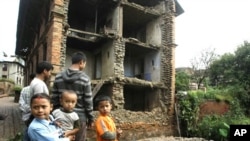Heavy rain and landslides are complicating the search for survivors of a 6.9 earthquake that has killed at least 53 people in an isolated Himalayan region straddling India, Nepal and China. The quake, centered in India's northern state of Sikkim, killed at least 63 people and left many other missing.
More than 5,000 Indian Army forces have been deployed to aid in earthquake rescue efforts in India's mountainous Sikkim state.
The 6.9 magnitude earthquake struck the region Sunday evening, knocking out electrical power and disrupting communications.
Heavy monsoon rains prevented flights to the area until midday Monday, permitting little other than foot traffic for some time. Limited airdrops of food and rescue personnel have since commenced.
A key highway running through the state was blocked by numerous landslides, and the road surface was cracked and fissured by the force of the quake. Teams have since cleared a path to the state capital, Gangtok, but northern Sikkim remained unreachable late Monday.
Indian Home Secretary R.K. Singh says there has been some progress.
"Power has been restored. The damage is not very extensive," he said. " There have been major cracks in the buildings but not many house collapses, at least not in the major towns."
But Ranjit Sinha, director-general of India's Indo-Tibet Border Police, says more rural areas have been badly hit.
He says many villages have been devastated. Huts were flattened, and people had to leave their homes. He says his forces were among the first to arrive and helped about 400 men, women, and children to settle into temporary camps and look for family members.
A key job for emergency personnel on the scene is to restore calm among the people of Sikkim. Sanjay Saraf is a lawyer who works in the state capital, Gangtok.
"People are terrified in the sense everybody's [apprehensive] it might come back again, after the shock," he said.
Other Gangtok residents recall the moment the quake struck.
Ashique Akram says there was pandemonium on the roads. People were running and screaming, he says - we did not know what was happening.
Shama Praveen, a Sikkimese Muslim, says she was in the middle of evening prayer when she felt a huge shock. She says every sound she hears makes her worry that another quake is coming.
Quake-related deaths have also been reported in Bihar and West Bengal states. The tremor was felt in the Indian capital, New Delhi, some 1,000 kilometers away and in the neighboring countries of Bangladesh and Bhutan.
At least seven people have been killed in southern Tibet, near the Sikkim border.
In Nepal, authorities reported at least seven quake-related deaths.
Indian Prime Minister Manmohan Singh called an emergency meeting on Monday to coordinate the disaster response.
Death Toll Rises in Aftermath of Himalayan Quake




